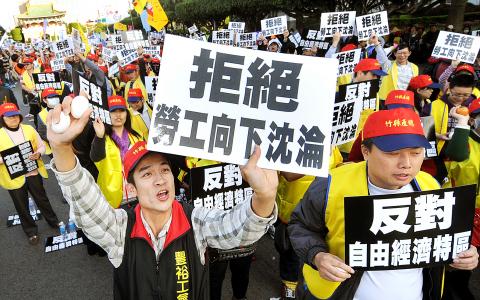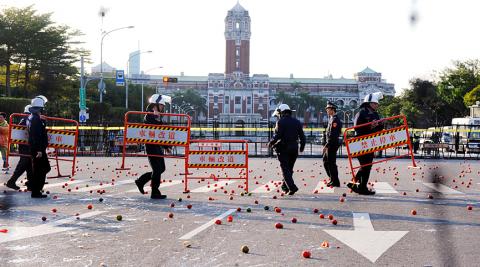Thousands of people from workers’ unions and labor groups took to the streets in Taipei yesterday, demanding that the government protect workers’ rights.
Initiated by the National Federation of Independent Trade Unions (NAFITU), workers organized by more than a dozen groups from across the country arrived at Taipei’s Ximending (西門町) at noon yesterday and headed out to the streets holding signs bearing their demands, such as “basic guarantees,” “uncut payment” and “against the free-trade island [policy] and worsening labor conditions.”
The NAFITU said President Ma Ying-jeou (馬英九) had spoken about the government’s plan for leading the nation to become a “free-trade island,” increasing collaboration between industry and schools and reforming the labor insurance annuity scheme in his speech on New Year’s Day.

Photo: Fang Pin-chao, Taipei Times
However, these policies should not be achieved by sacrificing the working conditions in Taiwan — such as reforming labor insurance by cutting the basic payments for retired workers, or cooperating with the business sector to turn students into cheap labor for companies, it said, adding that the march aimed to make it clear to the president that workers will not accept reforms that only benefit corporations.
NAFITU president Chu Wei-li (朱維立) said the protest appealed for five demands: not cutting the labor insurance annuity payment, basic guarantees for retirement, government budget appropriation to supplement the Labor Insurance Fund if it fails to provide basic guaranteed payments, not loosening labor regulations for a free economic demonstration zone and amending Article 28 of the Labor Standards Act (勞動基準法).
The groups said that the minimum monthly retirement payment from the labor insurance annuity is currently only NT$5,183 after working for 15 years and NT$8,733 after working for 30 years, and an average worker receives only about NT$13,000 — all lower than the government’s data from last year, which showed the average living expenses in Taiwan total about NT$18,465 a month.

Photo: Lo Pei-der, Taipei Times
They urged the government not to cut the labor insurance annuity payment, which is already not enough to maintain average living standards, and said it should guarantee a basic living by supplementing the payment with government funding or from taxes imposed on employers and company owners.
Following the march, the protesters converged in front of the Presidential Office on Ketagalan Boulevard, where the event organizers staged a skit and delivered speeches. The demonstration ended peacefully after the protesters, having been given two warnings by the police that they were violating the Assembly and Parade Act (集會遊行法), threw tomatoes and eggs toward the Presidential Office, from which they were separated by barricades and police.
“We have not seen the government announce policies protecting workers’ rights, nor any sincerity toward workers,” Taoyuan International Airport Services Union standing director Yang Shao-yung (楊少庸) said, adding that despite the large number of protesters, the government failed to even send out an official to meet with them.
“Today we used only tomatoes to express our anger and dissatisfaction. Further demonstrations on larger scales may be held in the future,” he said.

DEFENDING DEMOCRACY: Taiwan shares the same values as those that fought in WWII, and nations must unite to halt the expansion of a new authoritarian bloc, Lai said The government yesterday held a commemoration ceremony for Victory in Europe (V-E) Day, joining the rest of the world for the first time to mark the anniversary of the end of World War II in Europe. Taiwan honoring V-E Day signifies “our growing connections with the international community,” President William Lai (賴清德) said at a reception in Taipei on the 80th anniversary of V-E Day. One of the major lessons of World War II is that “authoritarianism and aggression lead only to slaughter, tragedy and greater inequality,” Lai said. Even more importantly, the war also taught people that “those who cherish peace cannot

STEADFAST FRIEND: The bills encourage increased Taiwan-US engagement and address China’s distortion of UN Resolution 2758 to isolate Taiwan internationally The Presidential Office yesterday thanked the US House of Representatives for unanimously passing two Taiwan-related bills highlighting its solid support for Taiwan’s democracy and global participation, and for deepening bilateral relations. One of the bills, the Taiwan Assurance Implementation Act, requires the US Department of State to periodically review its guidelines for engagement with Taiwan, and report to the US Congress on the guidelines and plans to lift self-imposed limitations on US-Taiwan engagement. The other bill is the Taiwan International Solidarity Act, which clarifies that UN Resolution 2758 does not address the issue of the representation of Taiwan or its people in

US Indo-Pacific Commander Admiral Samuel Paparo on Friday expressed concern over the rate at which China is diversifying its military exercises, the Financial Times (FT) reported on Saturday. “The rates of change on the depth and breadth of their exercises is the one non-linear effect that I’ve seen in the last year that wakes me up at night or keeps me up at night,” Paparo was quoted by FT as saying while attending the annual Sedona Forum at the McCain Institute in Arizona. Paparo also expressed concern over the speed with which China was expanding its military. While the US

‘FALLACY’: Xi’s assertions that Taiwan was given to the PRC after WWII confused right and wrong, and were contrary to the facts, the Ministry of Foreign Affairs said The Ministry of Foreign Affairs yesterday called Chinese President Xi Jinping’s (習近平) claim that China historically has sovereignty over Taiwan “deceptive” and “contrary to the facts.” In an article published on Wednesday in the Russian state-run Rossiyskaya Gazeta, Xi said that this year not only marks 80 years since the end of World War II and the founding of the UN, but also “Taiwan’s restoration to China.” “A series of instruments with legal effect under international law, including the Cairo Declaration and the Potsdam Declaration have affirmed China’s sovereignty over Taiwan,” Xi wrote. “The historical and legal fact” of these documents, as well